My love affair with Japan probably started before birth.
I say this because my parents are Japanophiles. So much so that growing up my father actually studied Japanese tea ceremony. (I was more than a little embarrassed once or twice as a boy when my friends would sleep over and catch glimpses of my dad paddling down the stairs in his wooden sandals and kimono, departing to study tea ceremony.)
But I now like to imagine that when I was a fetus my mom ate her fair share of rice balls, and seaweed, and probably even sashimi, and that little morsels of umami rich food passed from her bloodstream into mine thus sealing my fate as a lover of all things Japan.
And each time I visit Japan (which has been at least every other year since 1998,) I am always amazed by just how very exceptional and wonderful Japan and the Japanese are.
And it seems to me that there are three main ways that the Japanese are exceptional.
Quality 1: Etiquette
The rules of social engagement in Japan are so incredibly intricate, that they are almost impossible for a westerner to understand.
It is as if everyone is involved in an ornate play of manners. There is a correct way to speak to someone who is socially your superior, and your inferior. There’s a correct way to speak to someone of your own gender and to someone of the opposite gender. There is a correct way to speak to someone younger or older than you. And it goes on. There is an unwritten and detailed playbook for social interactions that seemingly everyone knows and obeys.
The results of this shared set of values and rules is that Japan runs very smoothly. There is rarely any confrontation, and there is no crime to speak of.
Everything works and nothing is broken.
To be sure this can be creatively stifling for a native Japanese enmeshed in the culture, but it is also a source of great cohesion and pride within Japanese society.
And when I visit Japan my lack of sensitivity to these social rules (in combination with my large body’s inability fit into tight Japanese spaces without knocking stuff over) often makes me feel like some kind of a less evolved caveman.
Quality 2: Tidiness
I can’t believe how organized and clean people are in Japan.
One example that comes to mind is my father-in-law, Yasuo.
In the American context his doppelgänger would be a charming and relaxed businessman. He’s extremely social and generous and kind. And he likes nothing so much as giving gifts to other people.
He used to love to drink sake and socialize late into the night, though now he does not do this for health reasons.
And I mention this all because he is simply not the anal retentive engineer type. His personality is very relaxed and easy.
And yet when we get home from a family outing it is not at all uncommon for him to drop us off and send us inside the house. 15 minutes later we can still find him outside organizing his car and finding artifacts left by my children (like cicada Shells in a Ziploc bag) lodged under the front seat.
Another example: it is 5 AM and Yasuo and I are driving to his friends house to pick him up for a golf outing at 5 o’clock in the morning. In the early morning light there’s a woman sweeping a narrow neighborhood street with an old-fashioned broom who moves to the side of the street and bows to us as we drive by apologizing for the inconvenience caused by her voluntary tidying of the public space.
And a final example: homeless people. Kyoto is a big city of greater than 1.4 million people. And there are homeless people in Kyoto too. Just like in America they often seek shelter under bridges. But usually their homeless encampments are better organized than my house. Bags of aluminum cans neatly tied off and stacked in the corner. Sleeping bags and sleeping mats rolled up into neat little rolls. Even bonsai kept in Little pots and meticulously watered and pruned.
Japanese homelessness = chic
Quality three: Quality
Almost everyone has a slavish devotion to quality in Japan.
Even if you go to McDonald’s. Everything is executed just right. The big Mac is centered neatly in a big Mac box. The french fries are perfectly packed into their immaculate French fry container. The bag is rolled just so. The counter person says just the right thing in a perfectly polite and pleasant manner. There is no slacking.
I am convinced that this is why Toyotas do not break down for a long long time.
In Japan it is simply assumed that everyone will do a great job, no matter how menial the task. And with few exceptions, everybody does.
Japanese Ramen is “Quality”
And I share these qualities not because I am convinced that Japan is better than America, (I don’t believe that) but simply to point out that Japan is exceptional in many ways.
And the reason that I mention this is because of this chart:
Courtesy of Meb Faber
This chart syncs up the biggest economic bubbles ever seen in Japan versus America.
The redline is the cyclically adjusted price to earnings ratio of the Japanese stock market, and the blue line is the cyclically adjusted price to earnings ratio of the American market.
The CAPE ratio is simply one way of valuing the market. So the higher the CAPE value the more expensive stocks are on average at that particular time.
You can see that at its peak of its bubble the japanese stock market had a CAPE ratio of 95! To put that in perspective the largest bubble we’ve ever experienced in America was the .com bubble and it’s peak CAPE ratio was less than 45.
So I like to imagine myself as a Japanese businessman like my father-in-law in 1989….
The economy is humming. The amount of invested money in Japanese companies represents 45% of the whole world stock market.
And I can see evidence of this economic domination everywhere.
All of my business friends have Rolexes, and I do too, and so do my wife and my kids. (Lavish gifts are exchanged around the holidays.)
Our Japanese companies are buying up the most expensive properties in the world, like the Pebble Beach golf links and Lincoln Center.
And the evidence for why this is so is all around me. We are the Japanese. We are hard-working and industrious. No one cares more about quality than us and this attention to detail is reflected in our products like the Sony Walkman and the Honda accord.
And like investors all over the world I feel very comfortable investing 80 or 90% or more of my stock portfolio in Japanese companies. (This phenomenon is called the home country bias.)
But just look at the subsequent performance of the Japanese stock market since 1989.
Being “all in” on the Japanese stock market in 1989 was not a very good place to be in retrospect.
The decades that followed 1989 are simply known as “the lost decades”, for obvious reasons.
And I mention this because recently the US Stock market has been doing very well relative to the world.
Here’s a nice graph depicting the stock market value in America versus foreign and emerging markets since the financial collapse.
The US stock market has outperformed, pure and simple. And this recent outperformance is now evident in the valuation of our stock market. The S&P 500 CAPE ratio stands at 26.46 today. (Average is about 17. 30 is “bubbly”.)
And perhaps this is because America is exceptional.
We do have a number of advantages: We hold the worlds reserve currency, we are separated by vast oceans from potential enemies, we are rich in natural resources, we have a liberal approach to immigration, and we have a relatively functional political system.)
But what exactly is lost by eliminating the home country bias? Since America has been one of the best performing countries in terms of stock market performance over the last 40 years or so, would we have been much worse off by investing 50/50 in the US and the rest of the world versus putting all of our pennies in the US stock market?
Portfolio 1 = USA, Portfolio 2 = International, Portfolio 3 = 50/50 mix
The above graph compares a 100% US stock portfolio to a 100% international portfolio, to a 50/50 mix of the US /international stock portfolio from 1971-2013. And it is fairly clear that not much is lost (and something is gained) by diversifying internationally.
So while I believe that America is an exceptional country, and I’m very grateful that I was born here, I’m certainly not willing to bet my retirement that its stock market will outperform the world going forward, particularly when its stock market is currently expensive relative to the rest of the world.
After all Japan was an exceptional country in 1989, and it’s an exceptional country today. But the performance of its stock market from 1989 to now has been anything but exceptional.

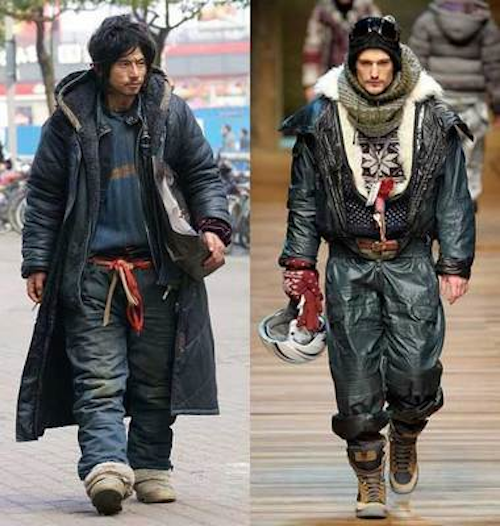

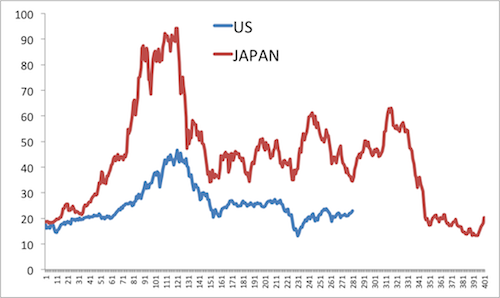
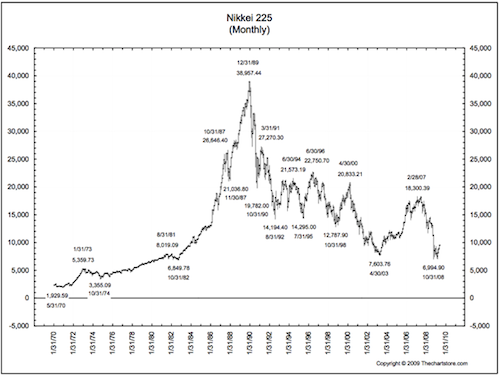
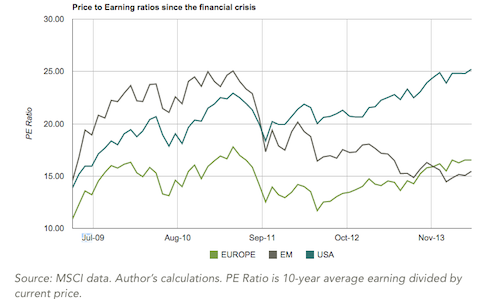
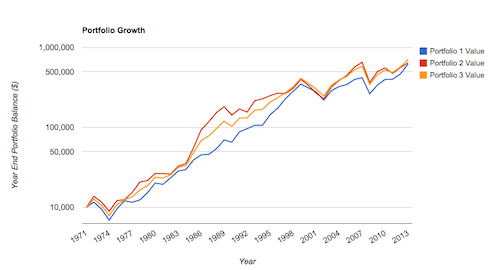
12 Responses to “Turning Japanese”